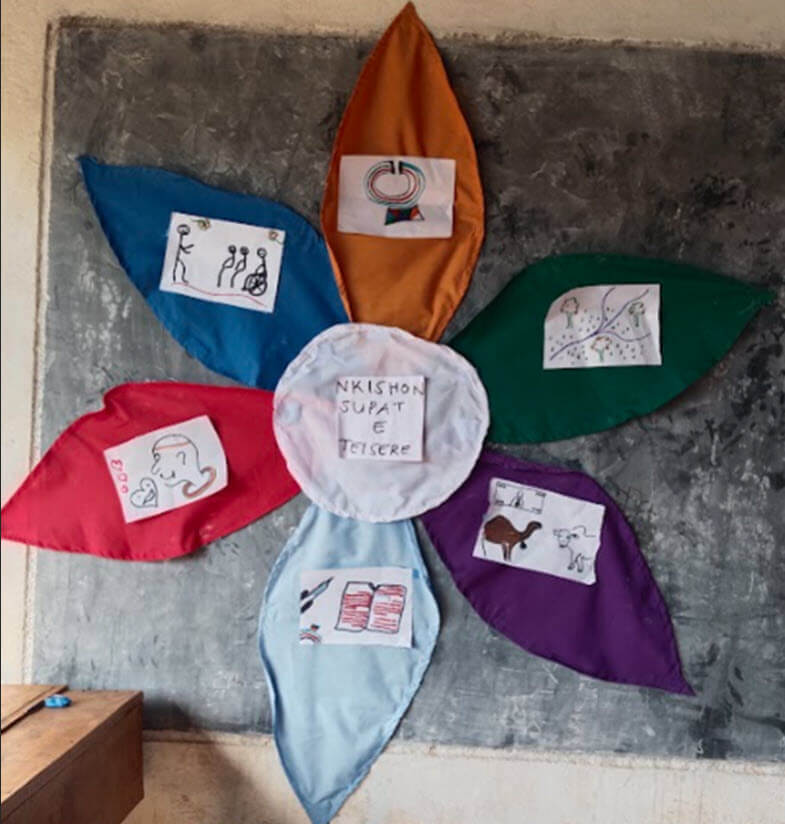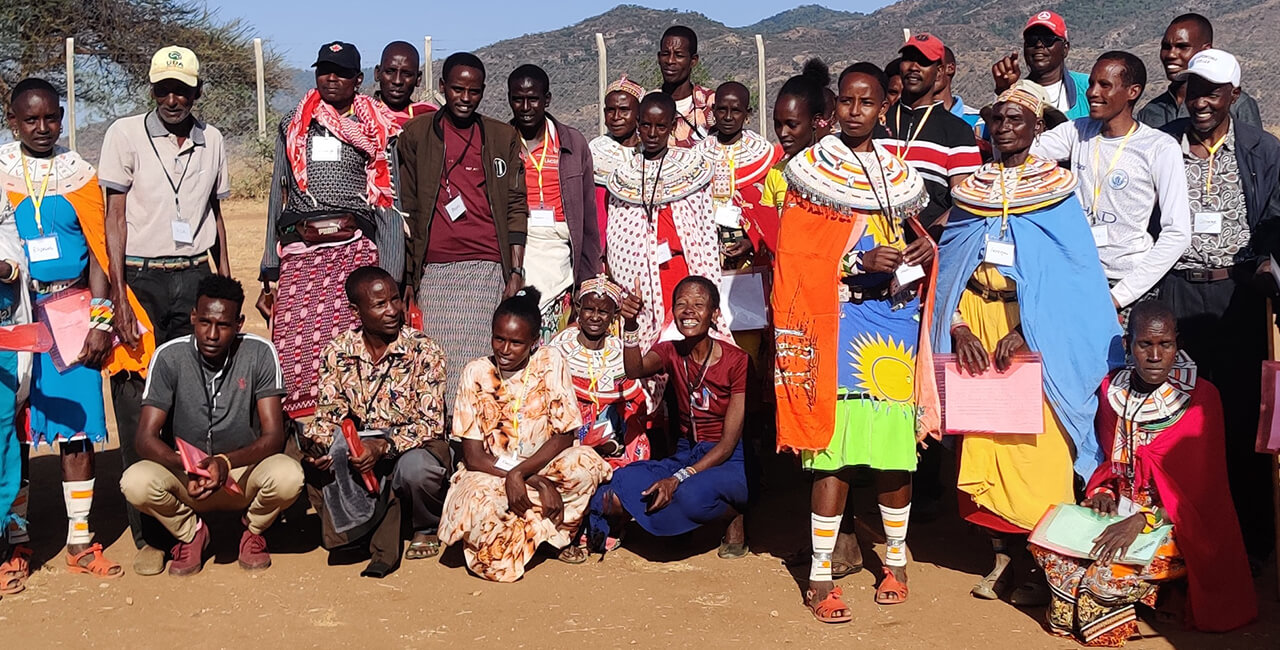“The community owns the conservancy, and we live in it, so we must manage it. Now, with more awareness, everyone gets a seat at the table to make decisions.”
 A planning workshop with the Samburu people in northern Kenya’s Ngilai Wildlife Community Conservancy used a flower image to convey a powerful idea. A flower in bloom symbolised “thriving people in thriving places.” Six petals represented the different dimensions people need to thrive: a healthy environment, education, culture, livelihoods, human health, and governance. Workshop participants discussed how they would rate themselves in each dimension before developing goals towards realising their own “thriving future.”
A planning workshop with the Samburu people in northern Kenya’s Ngilai Wildlife Community Conservancy used a flower image to convey a powerful idea. A flower in bloom symbolised “thriving people in thriving places.” Six petals represented the different dimensions people need to thrive: a healthy environment, education, culture, livelihoods, human health, and governance. Workshop participants discussed how they would rate themselves in each dimension before developing goals towards realising their own “thriving future.”
This was one in a series of workshops facilitated by Legado that involved community representatives from across the conservancy. The workshop participants included traditional leaders alongside women and youth, voices not typically represented in such gatherings. The representatives came together to understand their rights and map community assets, strengths, and challenges. They also prioritised individual and shared development and conservation goals. The objective: to foster community-led planning and action for the well-being of the people and the place they call home.
Legado’s role in community-driven change
Legado launched in 2014 after an expedition of biologists, climbers, conservationists, and filmmakers spent a month exploring Mozambique’s second highest peak, Mount Namuli, and worked with Indigenous communities to understand their conservation priorities.
Since then, Legado has grown its relationships with Indigenous peoples and local communities in Mozambique, Kenya, and Peru. It ensures they have the tools, resources, and partnerships they need to design and implement solutions that benefit their communities and landscapes–a model Legado calls "Thriving Futures."
 Legado brings together members of local communities to understand their rights and to map community assets, strengths, and challenges.
Legado brings together members of local communities to understand their rights and to map community assets, strengths, and challenges.
Thriving Futures positions Indigenous peoples and local communities in the lead of planning and decision-making for their well-being. It taps into local knowledge and utilises community assets and strengths while prompting the development of individual and collective legacy. “Your legacy is something you create every day with your words, your actions, and within your community,” says Tita Alvira, chief partnerships and programmes officer at Legado. “You lead both the creation of this legacy and how you bring it to life.”
Why Legado adopted a community-driven change approach
Early in its work, Legado realised that a deep-rooted knowledge of community and environment was instrumental in designing effective solutions. Often, individuals and communities affected by climate shocks and stresses were not included in organisations’ planning or development efforts. Additionally, organisations tended to focus on conservation without recognising that communities do not perceive or experience their challenges in silos.
The Thriving Futures model recognises the strong interlinkages between the overall well-being of Indigenous peoples and their culture, governance, and environment. It focuses on activating Indigenous peoples’ leadership and ownership of their own development efforts so they can pursue priorities that create sustainable solutions.
Facilitating a shared vision and collective ownership
As part of its model, Legado works closely with community leaders, local nonprofits, and government to create a platform for stakeholders to define priorities in a process that institutionalises local ownership. “Previously, finalised plans were brought to us. Now we own our priorities through our legacy plans,” says a community representative.
Community representatives collaborate with Legado to assess assets, reflect on existing issues, and discuss initiatives and practices. They then decide whether to maintain, improve, or restore practices. This process is critical in unpacking the cause of community issues while enabling community members with unique lived experiences to share their diverse perspectives.
Collectively, community representatives agree on three or four initial priorities, creating community-led implementation plans designed to ensure the desired results. The community holds regular meetings to evaluate progress and promote local leadership, inclusivity, consensus-based decision-making, and respect for community autonomy.
Strengthening the community’s leadership and asset base
The Thriving Futures model supports community representatives to use their voice and influence within the community, as well as with external stakeholders.
For example, in Kenya’s Lolkuniyani village, women were hesitant to deliver their babies at a dispensary (a basic health clinic) because of its unfamiliar environment and unfamiliar birthing norms. Recognising the importance of institutional births and also respecting local culture and traditions, women in the community organised to establish a maternity shelter that offers access to both traditional maternity care and supplemental or emergency care. The shelter, built by 28 women and seven men, uses local materials and reflects key aspects of Samburu design, including a traditional birthing pole and a beam across the length of the structure to represent strength of family.
“It was a need identified by us, so we decided to build this shelter on our own, [seeking] help from Legado and government as needed,” says Roselyn Lororua, the head nurse. In doing this, the women have created a legacy for future generations. “Legado’s [Thriving Futures] model has been helpful because they do not tell us what we should do, but instead help us identify our strengths to uplift what we do not have,” says a community member.
Focusing on equity
Planning workshops play an important role in creating spaces for groups traditionally under-represented in community discussions and decision-making to share perspectives. Their inclusion challenges power dynamics, allowing a more equal share of voices and fostering discussions about challenges and aspirations that consider the entire community.
For instance, Kenya’s community conservancy boards (a type of legally recognized entity) are mandated to fill a third of positions with women, yet due to cultural norms, women representatives are often hesitant to speak in meetings dominated by men. To address this, Legado creates spaces for women’s participation and leadership, then encourages women to speak in larger meetings where priorities are collectively decided.
Mayanae Lemojong, a board member and vice chair of the Ngilai Wildlife Community Conservancy, observes: “In the past, I didn’t know anything and was simply being led. Now, I am a leader who can lead many. I can lead the community by sharing the knowledge I have gained by taking care of trees, water sources, and anything about conservation.”
By focusing on including women and youth in representative decision-making, Legado helps challenge exclusionary social norms and power structures.
Outcomes in communities
One of the major outcomes of Legado’s efforts in Kenya has been a more systematic approach to ensuring that Indigenous peoples and local communities can direct the use of funds from government and nongovernmental organisation sources to pursue their own development priorities.
Legado’s commitment to information sharing, accountability, and transparency have also spurred higher community engagement. For example, data from a 2023 Legado internal evaluation in Kenya showed that its model led to 12 times the number of community members engaging in decision-making. “We had an annual general meeting as a community and saw that we can also participate and have a voice,” says Richard Newman Lenaseyan, a resident of Ntepees village in Ngilai. “Earlier, projects came dictating what the community needs, but now it’s changing. We feel in charge of identifying our needs and developing a plan.”
In Kenya specifically, Legado’s Thriving Futures model has been instrumental in stimulating a mindset shift in the community and with local partners such as the Northern Rangelands Trust. It supports communities in developing conservancy plans that advance community and environmental well-being. The Northern Rangelands Trust is finding ways to integrate Legado’s Thriving Futures model into its own community work.

